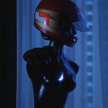Tomorrow, Tomorrow, and Tomorrow
Aldous Huxley comes to the rescue amidst global chaos.

“Tomorrow, Tomorrow, and Tomorrow” is an essay written by Aldous Huxley, and it can be found in his book called Tomorrow, Tomorrow, and Tomorrow, which can be purchased here, here, and here.

The premise is a little difficult to sum up justly. The book is a collection of what they’d call “creative nonfiction” essays, and it’s nonfiction in the realest sense - questioning ideas such as knowledge, industry, and my favorite, the amphibiousness of man. We are frogs.
“Every human being is an amphibian - or, to be more accurate, every human being is five or six amphibians rolled into one. Simultaneously or alternately, we inhabit many different and even incommensurable universes.
To begin with, man is an embodied spirit. As such, he finds himself infesting this particular planet, while being free at the same time to explore the whole spaceless, timeless world of universal Mind. This is bad enough; but it is only the beginning of our troubles”(1).
So, are you going to accept your froghood?
An Aside Before We Dive: Why I Need Huxley’s Voice Right Now
I first came across this man for the same reason everyone else does. I was forced to read a book of his in high school. I didn’t really know what to expect from a cover that looked like

But I’d seen it before. At home was a copy my brother had stolen from the library (motives unknown). As a little kid, I’d often stare at it. I thought it was exceptionally gross and disgraceful to all storybook illustrators. What’s with this man who can’t dance?
That’s essentially what Huxley is not. He’s a great dancer, and you can tell just by his writing. I actually didn’t end up SparkNoting Brave New World. Instead I found myself sinking deeper into the ramblings of man who, to be honest, sounded like a nuclear version of everyone else I knew. Though, what ended up attracting me was something special about his words. They didn’t make images. They broke them.
In the dystopian BNW for instance, Huxley isn’t romantic; rather his thoughts are naked and topsy-turvy. Take for instance, the way his protagonist Bernard gets distracted while on a fancy tour -
“At this moment, and for no apparent reason, Bernard suddenly remembered that he had left the Eau de Cologne tap in his bathroom wide open and running.”
Even in utopia, we’ll be problematic about leaving the stove on. That’s when I knew, this guy gets it.

Aldous Huxley had a real thing for humanity, and perhaps because of the dexterity with which he communicated, he brings to light the universality of our nature. This achieves two things - 1) makes you considerably more compassionate towards others, and 2) chips away at your own individualism. He’s disillusioning, in a good, healthy way.
So it’s unsurprising that this was the sort of voice I’d been craving these days. “These days” as in both the political and personal tides of summer 2020. The real “Summer of Love,” let’s more than hope.
The 60s Are Calling
When I first read the title of the essay, “Tomorrow, Tomorrow, and Tomorrow,” I was mulling over the fact that history is repeating itself right outside my window. We have climaxing racial tensions, then throw in a pandemic, a humanitarian crisis in Yemen, and perhaps a million other things going on right underneath our noses. Even the well-informed can’t help but be paranoid.
Paranoia aside for now, I want to zoom in on Black Lives Matter as it is the most local to me. The hope is that exploring this cause, with Huxley’s help, will provide clarity on how to handle these other global conflicts as well.

First, my heart goes out to the protesters in the streets. To those educating themselves about systemic racism at home. To those who cannot even partake in BLM because they’re dealing with Covid. Despite the height of the movement, rightfully loud for being so overdue, I couldn’t get rid of this pit in my stomach. I just don’t want us to end up as another tick on a timeline in some kid’s history book.
Insofar government response has been sluggish and incomplete. Reasonable demands are met with resistance everywhere, not only bureaucratically, but in the public, in the media, in my family, and most despairingly, in my own breaks of inaction. This resistance does not give way to actual, turn-the-world-right-side-up change. Rather it presents the potential danger of settling for “progress.” This is a notion that I had once adored and rallied. But progress is the tomorrow that never comes.
No one put it better than James Baldwin when he said Americans are “cruelly trapped between what we would like to be and we actually are.” What are we actually, and why are we trapped? To answer these two questions, Huxley asks a third.

What Might Tomorrow Bring?
According to him, around the 1800-1900s “the doctrine of Pie in the Sky gave place, in a majority of Western minds, to the doctrine of Pie on Earth”(137). If I could propose, perhaps the transition between salvation after death, to salvation via earthly wealth (money, image, anything you want to hold on to) never actually occurred. Why? They’re the same thing, co-existing psychologically.
I must make a translation too. The word “salvation” is a little outdated. The real psychological pie in case is familiar to all of us - security, notably in the form of wealth and image (*synonymous, but we'll explore them separately for now).
I assume then, that Huxley must be referring to a defining moment in man’s history. One where the Pie on Earth gets bigger exponentially, especially for the West. These are the ages of Imperialism and Industrialism. (Keep in mind we live in a technological era, but the three aren’t really separable.) Around this time, human nature didn’t alter from its ways of millennia past, but now we capitalized on it unlike ever before. We could never have done this without the cross-continental exploitation of colored peoples, including via the Atlantic Slave Trade.
The Real Crime
The believers of Pie on Earth (that’s us, rich and poor man alike), “console themselves for their miseries by thinking of the wonderful time people will be having a hundred years from now, and then go on to justify wholesale liquidations and enslavements by pointing to the nobler, humaner world which these atrocities will somehow or other call into existence” (138). Huxley may have said that around the 50s, but the statement still rings true today.
We see this very obviously right here at home. The fact stands that the Prison Industrial Complex was an extension of slavery. It is modern slavery given how deliberately our law enforcement system has been written to undermine the lives of black communities. These decisions have been committed in the name of wealth. Consumers, whether they know it or not, benefit from this exploitation. But unlike in olden imperial and industrial days, we have whole new veins that make the average person unconsciously justify this particular enslavement.
Both our education and media have formed a popular culture which projects images - and for the black man in America, it is one of a criminal. The everyday influx of this image has preserved the racist attitudes of our colonial ancestors. It seems we’re always looking to improve these images, such as our own, but we never question their existence to begin with.
So why do people believe in images? I couldn’t simply look to Huxley for the answer. Another resource as solid as any essay, book, or lecture is actually yourself. Oftentimes our plain, runaway thoughts can be the most revealing. So I have to ask, don’t we want to hold on to an image of ourselves? It might not always be an exalted position, but we crave a convenient role that fits in our world. It’s that Pie again. By pondering our own images, accepting and inventing them without question day in and day out, we unthinkingly see other people as images too. And for the innocent who’ve lost their lives to police brutality, this habit has proved to be fatal.
Reading deeper into the essay, I realized these colonial slave owners genuinely believed that God had entitled them to those they owned. That their slaves were subhuman. My mind had always skimmed across such rhetoric as metaphorical because, as a product of the 21st century, there’s no way I could digest that seriously. Back then though, that was their reality. One might argue that going from “subhuman” to “criminal” is some wayward sign of softening up, but I can assure you that these two images (really, to drive the point home, image itself) are equally absurd and monstrous.

Craving Psycho-Pie
Perhaps if we as individuals didn’t live for this psychological pie by means of wealth and image, we would have been more sensitive to the injustice in our daily lives. Not on any level, political nor personal, would we have tolerated these crimes. Crimes that are ultimately the looting of actual life in the form of colored bodies. Maybe we’d realize how illogical it was to decimate whole communities, cultures, peoples, and continents, and upon emancipation then look at the whole globe and say “go” as if it were a fair race. History is like dominoes, you can’t just point at some fallen pieces and judge, completely blind to the entire catastrophic trail that preceded. Nor can one any longer ignore that this history is built into, and operates presently, within you and I alike.
This is why BLM is a defining moment not only for the US, but for the world. It calls for accountability on all ends, in the White House and in your own house. Unless we give equal regard to all life, then the following will always be socially acceptable: “To those who have shall be given and from those who have not shall be taken away even that which they have”(147). Actual security looks like families kept whole, children educated opportunely, workers paid sufficiently, and everyone freed from an image.
We’ve kept whole communities deprived. Realizing this is unacceptable, what can one actively do?
Stay updated on the Black Lives Matter movement. Read disillusioning literature. The indivisibility between oneself and environment is a theme Huxley pokes at throughout the rest of his book. If we are our world, and with our world being what it’s always been, then we must doubt ourselves most of all.

Out of nowhere, my mind snaps back to the cover of Brave New World. I realize I never looked at it closely. I see the man dancing spastically, but now I see his gears too.
About the Creator
Angalee Fernando
"I'm an average nobody" - Henry Hill, and my heart
☎️ @kirikidding






Comments
Angalee Fernando is not accepting comments at the moment
Want to show your support? Send them a one-off tip.